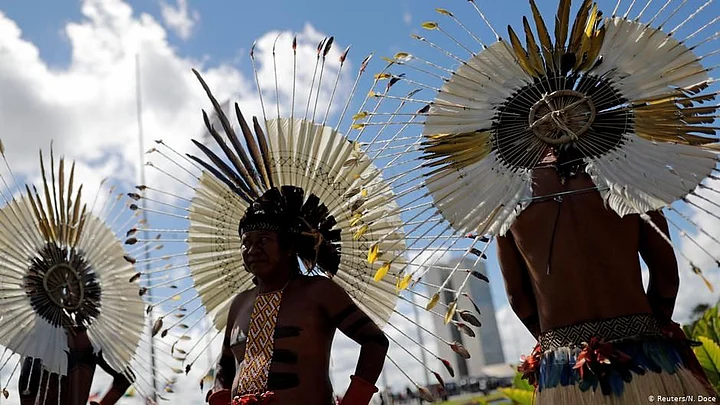Thousands of indigenous people representing more than 300 Brazilian tribes marched to government offices in the capital city of Brasilia on Friday, 26 April, and protested against the “anti-indigenous” policies implemented by the right-wing President Jair Bolsonaro, which they say threaten their land rights.
After Bolsonaro came to power on 1 January 2019, his government adopted various measures that infuriated indigenous people.
Shortly after taking office in January, the president signed an executive order to the Agriculture Ministry to alter regulations and create new indigenous reserves that can be controlled by the powerful agribusiness lobby.
He also shifted power from FUNAI indigenous agency, which previously had control over demarcation of the land reserves in Brazil, to the Ministry of Women, Family and Human Rights. This ministry is being governed by a far-right conservative leader and this decision has created a lot of agitation among the natives.
Other ministry heads have also taken decisions that have incensed the indigenous people. The Health Minister of Brazil Luiz Henrique Mandetta recently wrote, “We have figures for the general public that are much below what is spent on healthcare for the indigenous,” without giving further details. In March this year, he suggested transferring health sectors to the hands of municipalities, who are supposed to be less capable of providing healthcare services in native languages.
Bolsonaro has even openly said he supports the opening of the Amazon rainforest to resource extraction by corporation.
Bolsonaro said on Facebook: “The richness that exists in the Amazon, should be explored rationally for the well-being of our people and especially for the indigenous communities.”
CHALLENGING THE NGOs
The indigenous tribes make up almost 13% of Brazilian population. Bolsonaro has many times accused the famous Brazilian and international NGOs of violence and exploitation. "More than 15% of national territory is demarcated as indigenous land and quilombos," he wrote on Facebook, directly targeting the NGOs lending support and help to the indigenous tribes, "Less than a million people live in these places, isolated from true Brazil, exploited and manipulated by NGOs. Together we will integrate these citizens," he added.
THEIR FIGHT FOR LAND RIGHTS
Dressed up in distinctive body paint, with headbands made from the beautiful feathers of Amazonian birds, they waved their bows and arrows and beat their drums, while singing songs of outcry and protest. The march comes after a three-day long rally in Brasilia, called Free Land Encampment.
In an open letter published earlier this month by the French daily Le Monde, indigenous communities from all across the globe expressed their concerns against the anti-indigenous plans of Brazilian president: "Today we are particularly concerned about the situation in Brazil, since the election of the new President Jair Bolsonaro. For 100 days we have been living the first stages of an apocalypse, in which indigenous people are the first victims."
NOT ALONE IN THE FIGHT
On the first day of this year’s Free Land Camp, on 24 April, hundreds of supporters from all across the world gathered in front of Brazilian embassies in Europe and North America. This time, the message from all were loud and clear: Stand with the guardians of the forest to save the Amazon.
(With inputs from Reuters UK, BBC News, National Geographic)
